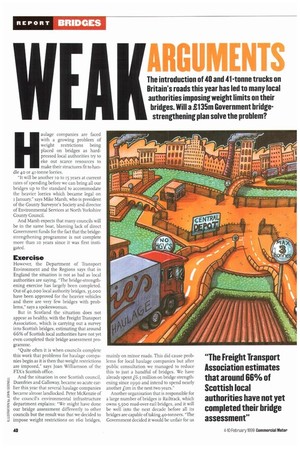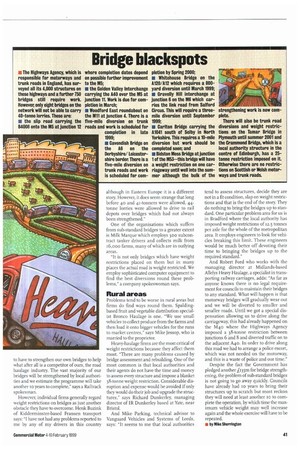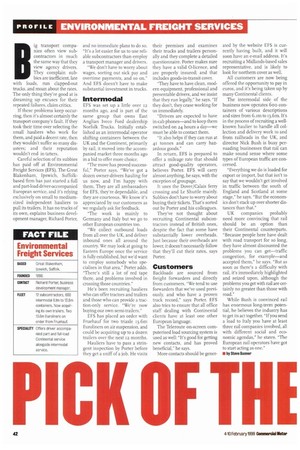ARGUMENT
Page 42

Page 43

Page 44

If you've noticed an error in this article please click here to report it so we can fix it.
The introduction of 40 and 41-tonne trucks on Britain's roads this year has led to many local authorities imposing weight limits on their bridges. Will a £135m Government bridge strengthening plan solve the problem?
Haulage companies are faced with a growing problem of weight restrictions being placed on bridges as hardpressed local authorities try to eke out scarce resources to make their structures fit to handle 40 or 41-tonne lorries.
"It will be another ro to 15 years at current rates of spending before we can bring all our bridges up to the standard to accommodate the heavier lorries which became legal on r January," says Mike Marsh, who is president of the County Surveyor's Society and director of Environmental Services at North Yorkshire County Council.
And Marsh expects that many councils will be in the same boat, blaming lack of direct Government funds for the fact that the bridgestrengthening programme is not complete more than to years since it was first instigated.
Exercise
However, the Department of Transport Environment and the Regions says that in England the situation is not as bad as local authorities are saying. "The bridge-strengthening exercise has largely been completed. Out of 4o,000 local authority bridges, 35,000 have been approved for the heavier vehicles and there are very few bridges with problems," says a spokeswoman.
But in Scotland the situation does not appear as healthy, with the Freight Transport Association, which is carrying out a survey into Scottish bridges, estimating that around 66% of Scottish local authorities have not yet even completed their bridge assessment programme.
"Quite often it is when councils complete this work that problems for haulage companies begin as it is then thatweight restrictions are imposed," says Joan Williamson of the FTA's Scottish office.
And the situation in one Scottish council, Dumfries and Galloway, became so acute earlier this year that several haulage companies became almost landlocked. Peter McKenzie of the council's environmental infrastructure department explains: "We might have done our bridge assessment differently to other councils but the result was that we decided to impose weight restrictions on r6o bridges, mainly on minor roads. This did cause problems for local haulage companies but after public consultation we managed to reduce this to just a handful of bridges. We have already spent £6.5 million on bridge strengthening since 1990 and intend to spend nearly another Dm in the next two years."
Another organisation that is responsible for a large number of bridges is Railtrack, which owns 5,500 road-over-rail bridges, and it will be well into the next decade before all its bridges are capable of taking 4o-tonners. "The Government decided it would be unfair for us to have to strengthen our own bridges to help what after all is a competitor of ours, the road haulage industry. The vast majority of our bridges will be strengthened by local authorities and we estimate the programme will take another so years to complete," says a Railtrack spokesman.
However, individual firms generally regard weight restrictions on bridges as just another obstacle they have to overcome. Henk Buzink of Kidderminster-based Fransen transport says: 'I have not had any problems reported to me by any of my drivers in this country although in Fastern F:urope it is a different story. However, it does seem strange that long before 40 and la-tanners were allowed, 4.4tonne lorries were allowed to drive to rail depots over bridges which had not always been strengthened."
One of the organisations which suffers from sub-standard bridges to a greater extent is Milk Marque which employs 300 subcontract tanker drivers and collects milk from 16,000 farms, many of which are in outlying areas.
"It is not only bridges which have weight restrictions placed on them but in many places the actual road is weight restricted. We employ sophisticated computer equipment to find the best diversions round these problems." a company spokeswoman says.
Rural areas
Problems tend to be worse in rural areas but firms do find ways round them. Spaldingbased fruit and vegetable distribution specialist Bronco Haulage is one. "We use small vehicles to collect produce from the farms and then load it onto bigger vehicles for the runs Lo market centres," says Mike Jessop, who is married to the proprietor.
Heavy-haulage firms are the most critical of weight restrictions because they affect them most. "There are many problems caused by bridge assessment and rebuilding. One of the most common is that local authorities and their agents do not have the time and money to assess every structure and impose a blanket 38-tonne weight restriction. Considerable disruption and expense would be avoided if only they would do their job and upgrade the structures," says Richard Dunkerley, managing director of IR Dunkerley based at Yate, near Bristol.
And Mike Parking, technical advisor to Vanguard Vehicles and Systems of Leeds, says: "It seems to me that local authorities .
tend to assess structures, decide they are not in a fit condition, slap on weight restrictions and that is the end of the story. They do nothing to bring the bridges up to standard. One particular problem area for us is in Bradford where the local authority has imposed weight restrictions of 52.5 tonnes per axle for the whole of the metropolitan area. It employs engineers to look for vehicles breaking this limit. These engineers would be much better off devoting their time to bringing the bridges up to the required standard."
And Robert Ford who works with the managing director at Midlands-based Allelys Heavy Haulage, a specialist in transporting railway carriages, adds: "As far as anyone knows there is no legal requirement for councils to maintain their bridges to any standard. What will happen is that motorway bridges will gradually wear out and we will be diverted to smaller and smaller roads. Until we got a special dispensation allowing us to drive along the carriageway, this had already happened on the M4o where the Highways Agency imposed a 38-tonne restriction between junctions 6 and 8 and diverted traffic on to the adjacent A4o. In order to drive along this road we had to arrange a police escort, which was not needed on the motorway, and this is a waste of police and our time."
Despite the fact the Government has pledged another 1,135m for bridge strengthening, the problem of sub-standard bridges is not going to go away quickly. Councils have already had so years to bring their structures up to scratch but most reckon they will need at least another so to complete the operation, by which time the maximum vehicle weight may well increase again and the whole exercise will have to be repeated. ig transport companies often view subcontractors in much the same way that they view agency drivers. They complain subbies are inefficient, late with loads, run clapped-out trucks, and moan about the rates. The only thing they're good at is dreaming up excuses for their repeated failures, claim critics.
If these problems keep occurring, then it's almost certainly the transport company's fault. If they took their time over selecting the small hauliers who work for them, and paid a decent rate, then they wouldn't suffer so many disasters; and their reputation wouldn't end in tatters.
Careful selection of its subbies has paid off at Environmental Freight Services (EFS). The Great Blakenham, Ipswich, Suffolkbased firm has just started a full and part-load driver-accompanied European service, and it's relying exclusively on small to mediumsized independent hauliers to pull its trailers. It has no trucks of its own, explains business development manager, Richard Porter,
and no immediate plans to do so. "It's a tot easier for us to use reliable subcontractors than employ a transport manager and drivers.
"We don't have to worry about wages, sorting out sick pay and overtime payments, and so on." And EFS doesn't have to make substantial investment in trucks.
Intennodal
EFS was set up a little over 12 months ago, and is part of the same group that owns East Anglian Iveco Ford dealership Norfolk Trucks. Initially established as an intermodal operator shifting containers between the UK and the Continent, primarily by rail, it moved into the accompanied market three months ago in a bid to offer more choice.
"The move has proved successful," Porter says. "We've got a dozen owner-drivers hauling for us now, and I'm happy with them. They are all ambassadors for EFS, they're dependable, and they are courteous. We know it's appreciated by our customers as we regularly ask for feedback.
"The work is mainly to Germany and Italy but we go to other European countries too.
"We collect outbound loads from all over the UK, and deliver inbound ones all around the country. We may look at going to Eastern Europe once the service is fully established, but we'd want to employ somebody who specialises in that area," Porter adds. "There's still a lot of red tape there, and problems involved in crossing those countries."
He's been recruiting hauliers who can offer tractors and trailers and those who can provide a traction-only service. "We're now buying our own semi-trailers."
EFS has placed an order with Fruehauf for two tria.xle 13,6m Euroliners on air suspension, and could be acquiring up to a dozen trailers over the next iz months.
Hauliers have to pass a stringent inspection by Porter before they get a sniff of a job. He visits their premises and examines their trucks and trailers personally and they complete a detailed questionnaire. Porter makes sure they have a valid 0-licence, and are properly insured; and that includes goods-in-transit cover.
"They have to have dean, modern equipment, professional and presentable drivers, and we insist that they run legally," he says. -If they don't, they cease working for us immediately.
"Drivers are expected to have in-cab phones—and to keep them switched on 24 hours a day—we must be able to contact them.
"It also helps if they can run at 41 tonnes and can carry hazardous goods."
In return, EFS is prepared to offer a mileage rate that should attract good-quality operators, believes Porter. EFS will carry almost anything, he says, with the exception of groupage.
It uses the Dover/Calais ferry crossing and Le Shuttle mainly. Subbies don't have to worry about buying their tickets. That's sorted out by Porter and his colleagues.
They've not thought about recruiting Continental subcontractors instead of British ones. despite the fact that some have substantially lower overheads. Just because their overheads are lower, it doesn't necessarily follow that they'll cut their rates, says Porter.
Customers
Backloads are sourced from freight forwarders and directly from customers. "We tend to use forwarders that we've used previously, and who have a proven track record," says Porter. EFS also tries to ensure that all office staff dealing with Continental clients have at least one other European language, The Teleroute on-screen computerised load sourcing system is used as well: "It's good for getting new contacts, and has proved beneficial," he says.
More contacts should be gener
ated by the website EFS is currently having built, and it will soon have an e-mail address. It's recruiting a Midlands-based sales representative, and is likely to look for northern cover as well.
All customers are now being offered the opportunity to pay in euros, and it's being taken up by many Continental clients.
The intermodal side of the business now operates Goo containers of various descriptions and sizes from G.im to 13.6m. It's in the process of recruiting a wellknown haulier to handle all collection and delivery work to and from railheads in the UK, and director Nick Bush is busy persuading businesses that rail can make sound sense where some types of European traffic are concerned.
"Everything we do is loaded for export or import, but that isn't to say that we wouldn't get involved in traffic between the south of England and Scotland at some stage," he says. "But the economics don't stack up over shorter distances than that?
UK companies probably need more convincing that rail should be an option than their Continental counterparts. "Because people here have dealt with road transport for so long, they have almost discounted the problems you can get—traffic congestion, for example—and accepted them," he says. "But as soon as there's a difficulty with rail, it's immediately highlighted and seized upon, although the problems you get with rail are certainly no greater than those with road."
While Bush is convinced rail has enormous long-term potential, he believes the industry has to get its act together. "If you send a load to Italy you have at least three rail companies involved, all with different social and economic agendas," he states. "The European rail operators have got to start acting as one."
• by Steve Banner








































































































